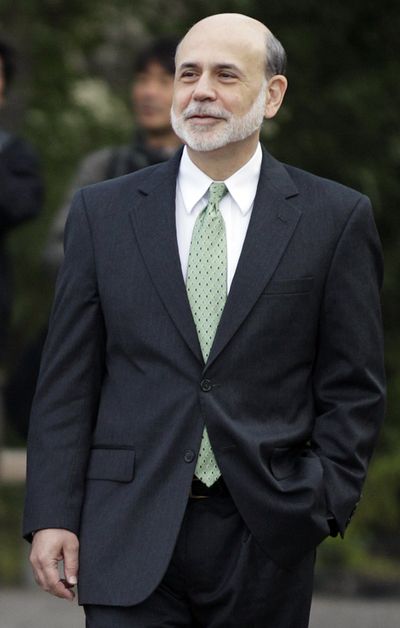Fed action could boost markets
But experts believe uptick would be temporary

NEW YORK – Will the stock market get more ammunition from central banks to go higher?
We will find out next week when Federal Reserve officials meet. They are widely expected to announce steps to prop up the ailing U.S. economy.
Any Fed action will come on the heels of Thursday’s bold program from the European Central Bank, which said it would buy bonds from countries such as Italy and Spain to ease their financial pressures and buy time to reduce their debt and reform their economies.
The Standard & Poor’s 500 index is up 14 percent this year. That’s thanks in no small measure to expectations building that the Fed will act. Friday’s tepid unemployment report provides the Fed with even more reason to act.
The Labor Department said employers added 96,000 jobs in August, fewer than experts had expected and the latest sign of weakness in the economy and poor prospects for the unemployed. Construction and manufacturing are also slowing.
Many now expect the Fed, led by Federal Reserve Chairman Ben Bernanke, to unveil a new bond-buying program at its meeting next week. The goal would be to lower long-term interest rates and encourage borrowing and spending.
While that may set off another rally in the stock market, strategists and experts question how much of a long-term effect it would have on the economy since interest rates are already so low.
The Associated Press asked three experts Friday for their views on these issues. Here are edited excerpts of what they had to say:
What will the Fed do?
• David Kotok, chairman and chief investment officer of Cumberland Advisors, believes that the very slow growth in the economy cannot be resolved by Fed action such as buying more bonds.
“Such a program will only send the 10-year Treasury note yield to 1.4 percent from 1.6 percent. Short-term interest rates are near zero and can’t go any lower. Mortgage rates are at their lowest in a half century and it hasn’t changed the pace of growth. In fact, the longer low interest rates persist, it will lead to a decline in interest earnings for the savers, which is a dangerous trend, because it leads to more economic slowdown,” Kotok said.
• Steven Ricchiuto, chief economist at Mizuho Securities, thinks the Fed is not likely to announce a new round of bond buying. Instead he thinks the Fed is almost certain – he gives it a 75 percent chance – of extending the period during which it will keep short-term interest rates near zero. Presently, the central bank says it expects to keep them there through late 2014. Ricchiuto said the Fed is likely to extend that through 2015. He said stock investors are likely to be “disappointed.”
• Hugh Johnson, chairman and chief investment officer of Hugh Johnson Advisors, also believes another Fed bond-buying program won’t make a difference to the economy.
“What will do the trick? Nothing that the Federal Reserve can do. The answer is that companies and individuals need to feel more optimistic about prospects, and that gets to tax and spending. If there was something dramatic to come out of Washington, such as a very sharp decline in tax rates and an increase in government stimulus, that might excite optimism and lead to more borrowing or spending or investing. But they’re not going to do something in Washington because they can’t agree.”
Does the ECB’s action take Europe off the table?
• Kotok: “The ECB has only bought time with its actions, and even that is questionable. What does it mean when the largest capital provider in Europe, Germany, is a dissenting vote and is public about it.” (Germany’s Bundesbank was the only “no” vote among European central banks.)
• Johnson: “I agree with everybody that they don’t do things right (in parts of Europe). … They need to clean up their fiscal act. But don’t try to do too much, because they’re hurting. If you raise taxes and cut government spending in those countries when their economies are already contracting, you’re asking for trouble.”
• Ricchiuto: “Governments still have to agree to and execute on austerity plans, and they’ve been reluctant to do that. At the end of the day, no politician wants to increase taxes or cut subsidies. You haven’t solved the fundamental problem.”
What scares you most?
• Kotok: “The one thing that worries me the most is that the system has no resilience for a shock. Shocks come without warning and from different venues and usually the system has resilience and has a shock-absorbing tool. But I fear that those have mostly been used in the last few years. There’s not a lot left in the tool box.”
• Ricchiuto: He is worried about the so-called “fiscal cliff” looming at the end of the year, when automatic spending cuts and tax increases kick in unless a partisan Congress can hammer out a budget compromise. If that happens, forget about a fragile recovery. He said the U.S. economy could shrink 4 percent and fall back into a recession.
• Johnson: “Europe is one of them, and the fiscal cliff is another one, and China is another one. These are all problems that threaten to derail the current cycle of recovery. But I don’t think they will. If there’s one message that I’ve gotten from the markets more recently, it’s that investors collectively are saying, ‘We’ll muddle through.’ And I think that’s the best you can hope for.”